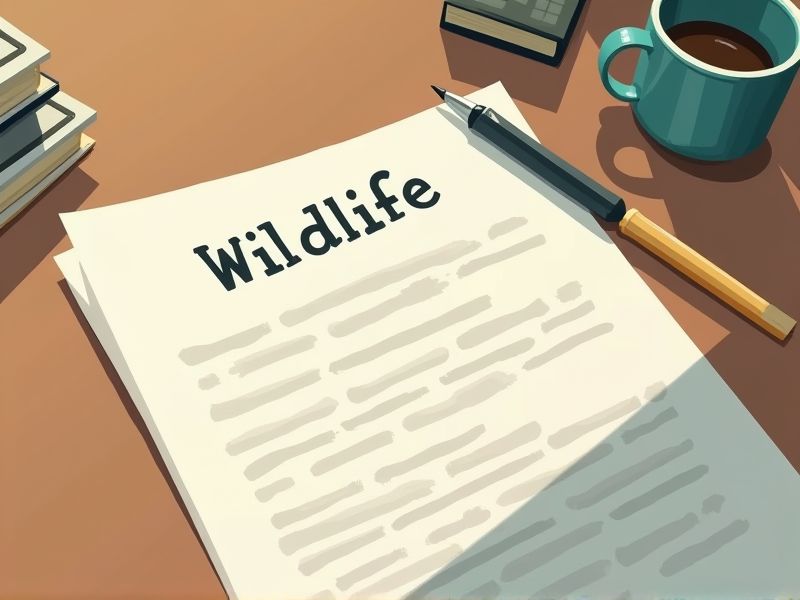
Wildlife biologists require specific certifications to ensure they possess the skills and knowledge necessary for effective species management and conservation efforts. These certifications validate their expertise in conducting field research, analyzing ecological data, and implementing habitat restoration projects. Without these credentials, gaining access to certain research areas or collaboration opportunities with government and environmental organizations becomes challenging. Important certifications often needed for a wildlife biologist include those related to wildlife handling, habitat assessment, and ecological monitoring.
Certified Wildlife Biologist (CWB)
Employers often require Certified Wildlife Biologist credentials to ensure professionals have met rigorous educational and experiential standards. Certification provides a structured pathway for biologists to demonstrate competency and commitment to the field. CWB accreditation signals to stakeholders that the biologist adheres to high ethical and professional standards. The credential can enhance job prospects and provide a competitive edge in the wildlife biology job market.
GIS Professional (GISP)
Wildlife biologists rely on GISPs to effectively manage and analyze spatial data, which is crucial for tracking animal movements and habitat usage. GIS technology helps identify critical areas that require conservation efforts by providing detailed mapping and analysis. The integration of GIS enhances decision-making processes by enabling more accurate predictions of ecological changes. GIS professionals can process large datasets quickly, allowing wildlife biologists to focus on fieldwork and research while staying informed with up-to-date spatial information.
Certified Ecologist (CE)
Certified Ecologists (CE) play a crucial role in enhancing the credibility and expertise of Wildlife Biologists by ensuring adherence to established environmental standards. Relevant certification ensures that Wildlife Biologists possess verified knowledge and skills crucial for effective ecosystem management. The certification process often entails rigorous assessments, providing assurance to employers and stakeholders about the biologist's competencies. In regulatory and conservation roles, a CE designation can assist in meeting legal requirements for ecological assessments and reports.
Pesticide Applicator License
The pesticide applicator license ensures that wildlife biologists manage and apply chemicals safely, minimizing ecological harm. Proper licensing confirms their understanding of state regulations and guidelines, crucial when working with sensitive wildlife environments. Without it, there is a risk of improper pesticide use that can negatively affect ecosystems and non-target species. Compliance supports effective wildlife management and conservation efforts, aligning with environmental safety standards.
Remote Sensing Certification
Wildlife biologists often require remote sensing certification to efficiently analyze large datasets from satellite imagery, aiding in habitat mapping. Reliable data interpretation from these sources can lead to more informed decisions in conservation efforts. Training in remote sensing technologies can enhance their ability to monitor changes in land use and its impact on biodiversity. Certified knowledge reduces the likelihood of errors, contributing to successful wildlife management plans.
Field Safety Certification
Field Safety Certification is essential for wildlife biologists as it ensures they are trained to handle dangerous situations, such as encounters with potentially aggressive animals. Certification helps in minimizing risks associated with working in remote areas where medical assistance may not be immediate. It provides the skills needed to use equipment safely, thereby preventing accidents during field research. This certification also reassures organizations and stakeholders about the biologist's capability to conduct research responsibly and reduce liability concerns.
First Aid/CPR Certification
Wildlife biologists often work in remote areas where access to immediate medical help may be limited, so a First Aid/CPR certification equips them with essential life-saving skills in case of emergencies. Handling wildlife can pose risks of injury or exposure to zoonotic diseases, necessitating prompt and effective medical response to minimize harm. Certification in these areas can enhance a biologist's ability to aid colleagues in distress, thus fostering a safer working environment. Trained professionals are better suited to adhere to safety protocols, reducing potential medical liabilities for their organizations.
Wildlife Habitat Management Certification
Wildlife Habitat Management Certification enhances a wildlife biologist's expertise, ensuring they employ scientifically backed methods to conserve ecosystems. This certification verifies their ability to implement effective management strategies that can counteract the damages of habitat loss and fragmentation. It increases credibility and trust among stakeholders and funding entities, fostering collaborative conservation efforts. By staying updated with the latest techniques and regulations, certified professionals are better equipped to address changing environmental challenges.
Environmental Impact Assessment Certification
Environmental Impact Assessment (EIA) Certification equips wildlife biologists with crucial skills to evaluate the potential impacts of projects on natural habitats. This certification ensures informed decisions to minimize adverse effects on biodiversity. Wildlife biologists can use EIA insights to advocate for sustainable project designs that preserve ecosystems. Regulatory requirements frequently mandate EIA for project approval, making it essential for wildlife biologists to collaborate effectively in conservation efforts.
Environmental Compliance Certification
Environmental Compliance Certification ensures wildlife biologists adhere to legal standards protecting habitats and species. This certification validates that biologists apply sustainable practices reducing harmful impacts on wildlife. Non-compliance can lead to detrimental ecological disruptions, legal penalties, and reputation damage. Certification enhances the credibility and effectiveness of conservation efforts.
Summary
When you obtain certifications as a Wildlife Biologist, you elevate your professional credibility, making you more competitive in the job market. Certifications signal your expertise and commitment, often leading to better job opportunities and potential salary increases. Gaining these credentials could enhance your knowledge and skills, improving your ability to contribute meaningfully to conservation efforts. You may also access a broader network of professionals, opening doors for collaborative projects and further career growth.
